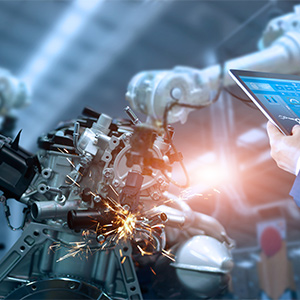The Role of AI/ML in Industry 4.0
Post By: Ryan King On: 18-04-2024 - Industry 4.0 - Industry Trends - Manufacturing
Artificial Intelligence (AI) is a branch of computer science that has developed a processing system capable of behaving like human intelligence. It can perform reasoning, calculation and analytical tasks and learn from these to improve its performance. Machine Learning (ML) is a primary contributor to AI because of its focus on learning and how this increases the capabilities of the system.
AI and ML have formed the driving force behind the fourth industrial revolution. Industry 4.0 features the development of “smart” machines and devices that can intercommunicate in a network, now evolved into the Internet of Things (IoT) and the Industrial Internet of Things (IIoT). AI is the foundation on which all these structures are based.
AI technologies have been incorporated into devices that can sense their surroundings and communicate this information to a central control system. This system then uses ML and big data analysis to resolve complex problems and learn how to avoid repeating such problems.
Impact of AI on Industry
Smart manufacturing is an integral part of Industry 4.0. It can integrate advanced intelligent systems into production processes. This saves time, improves quality and eliminates unnecessary waste. By using AI and ML to streamline and optimise these processes, we can also use them to react more efficiently and rapidly to changes. These changes may arise in product demand, customer requirements or external events throughout the value chain.
In manufacturing, AI offers considerable benefits in areas like predictive maintenance, inventory management, production planning, process control, machinery inspection and logistics. Industry strategy is also changing, as manufacturers can focus more accurately on sustainability, with an increasing shift towards customer-centric and often highly customised production. Technologies such as 3D printing have enabled some companies to turn towards on-demand production, adapting their strategies to lean manufacturing rather than keeping an extensive inventory.
The new technological advancements, especially in the IoT and IIoT, have leveraged the flexibility and agility of AI to solve many supply, production and logistical challenges. AI is now recognised as the essential technology for developing Industry 4.0. Only AI possesses the capabilities to manage the way we structure today’s industrial processes and business models.
 Development and Key Features of AI/ML in Industry
Development and Key Features of AI/ML in Industry
The role of AI is to understand what constitutes intelligence and to learn from human intelligence how to create computers that perform similarly to human beings. It’s a large and continuously expanding field of technology that underpins many of the most advanced approaches used in industry today. These include simulation, speech recognition and virtual reality, which have many different industrial applications.
Simulation
AI uses computer simulation systems to create a production model that can incorporate product improvement, quality control and safety features. These simulations can leverage extensive data analysis to improve production accuracy and efficiency. They can identify problems and take precautionary action to prevent or mitigate an emergency, reducing the risk of unplanned downtime. This helps to ensure a more efficient production system, reducing running costs and the risk of capital loss.
Virtual Reality
Technologies such as digital twins are increasingly used in large-scale industrial manufacturing like automotive and shipyards, where they eliminate the necessity of building physical models. A digital twin replicates a physical asset in virtual reality, where a constant flow of data allows design engineers to update the digital model in real time. They can be used to control, monitor and predict the behaviour of any product, throughout its entire lifecycle, thus achieving greater effectiveness and productivity.
Digital twinning allows various stakeholders – such as designers, end users and manufacturers – to participate in the product creation process. Connecting from anywhere on the globe, these participants can communicate with each other, sharing information on a single common project and enabling much greater precision in product and project management.
Speech Recognition
Advances in digital technologies and AI have made speech recognition applications commonplace – from asking your phone to search for something to telling your car where to go. They also allow your car to tell you where to go, as well as help identify and solve problems. These features will increase in importance when self-driving vehicles become more widespread.
In industry, AI and ML are making significant advances in areas related to customer service. AI chatbots can schedule functions like service calls or test runs, as well as fielding queries and giving customers advice. In the energy sector, for instance, speech recognition applications allow customers to inquire about billing or report outages. Speech AI can support field technicians, using voice commands to take notes or access work orders and streamline meter readings. In some applications, customers’ conversations are analysed by speech AI to assess their intent, sentiment and propensity. This allows customer service agents to formulate appropriate and effective responses.
How AI/ML Benefits Industry 4.0
The role of AI/ML technologies in Industry 4.0 is to aid the growth of companies in the manufacturing sector. They do this in several major ways, including the introduction of robotics and human-robot interfaces. This enables greater customisation and adding value throughout the production cycle. AI/ML applications also benefit process and plant automation, warehouse management and logistics and inspection.
Their predictive facilities improve equipment maintenance schedules and repair requirements, together with output and quality. AI/ML technologies increase supply chain value – locating and making better use of resources. This helps companies become more sustainable, reducing waste and better fulfilling customer demands.
AI applications also offer strategic benefits in business, such as faster decision-making, reduced levels of human error, rapid response, and assistance in troubleshooting problems. They’re able to function 24/7 and can work remotely, even in extreme conditions. They help workforces to perform repetitive jobs, improve the scope for creating and marketing new inventions and enhance cybersecurity. With connected systems and devices, companies can maintain secure, continuous and seamless communications with all involved parties.
Get More From Rowse Straight To Your Inbox



